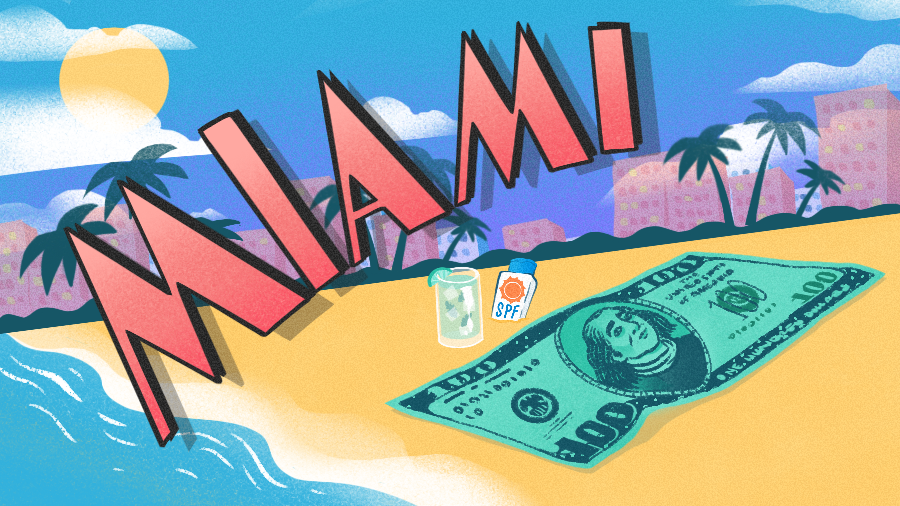As more entrepreneurs and investors relocate from traditional tech hubs to emerging startup ecosystems, Miami—with its tropical climate, diverse population and lack of state income tax—has suddenly become a tech hot spot.
Subscribe to the Crunchbase Daily
In 2020, high-profile investors including Founders Fund general partner Keith Rabois and Blumberg Capital founder David Blumberg moved to South Florida. Soon after, Miami Mayor Francis Suarez began promoting the city as an emerging tech hub, and at the start of the new year, there’s increasing attention on the south Florida city in tech circles.
While Miami’s tech ecosystem isn’t as robust as San Francisco’s, for example, more startup founders and investors in Miami could boost the area’s tech scene, which raised close to $1 billion in venture funding last year, according to preliminary Crunchbase data.
Alpaca VC general partner David Goldberg moved to Miami in August 2020 after living in New York for about 17 years. He already had ties to Miami—although he grew up in the northeast, he attended college at the University of Miami—and he’d kept tabs on the city’s startup ecosystem while running his startup based in New York. When he started his firm in 2014, he “planted the flag” in New York, but started visiting Miami more often as he wanted to invest in emerging ecosystems.
Then last year, the COVID-19 pandemic hit and Goldberg reassessed.
“We reflected on our priorities, both personal and business, and Miami just became the clear choice of ‘Where can I have maximum work-life balance, but also I’m still young so I need to be in a place where I’m surrounded by hard-working, driven people,’ ” he said. “I’m in a (place) where my career is still a priority for me. This is not a retirement decision for me.”
While Miami has drawn tech investors and founders for years, the COVID-19 pandemic seemed to accelerate the rate of migration, according to Rebecca Danta, managing director of angel network Miami Angels. In the fourth quarter of 2020, the influx was like a “big wave,” she said.
Throughout 2020 Danta met recent transplants to Miami. She has also heard about more people in the tech world quietly moving to the metro area. That’s starting to become more obvious, she said. “They weren’t necessarily getting involved in the business community, and now people are saying ‘I live in Miami, you should too,’ and they’re being ambassadors,” Danta said.
Rabois has been vocal about the upsides of living in Miami, telling Fortune Magazine recently that “Miami is an incredibly beautiful city, cosmopolitan, has an interesting mix of New Yorkers, Latin Americans, and Europeans,” and noting that Florida also doesn’t have a state income tax.
What spurred the interest locally was a tweet by Mayor Suarez who responded to Varda Space co-founder Delian Asparouhov’s idea of moving Silicon Valley to Miami, asking “How can I help?”
Since then, Suarez has continued to promote Miami as an emerging tech hub, frequently posting messages on Twitter about new tech moves to the city. Suarez’s team did not make the mayor available for an interview in time for publication.
Suarez has generated buzz via Twitter, similar to how U.S. Rep. Alexandria Ocasio-Cortez has connected with constituents through social media like Twitter and Instagram Live, according to Goldberg of Alpaca VC.
“It’s been really interesting to see the style of how well that’s worked,” he said. “It’s almost like what AOC did with her constituency and just speaking their language. Mayor Suarez has been able to tap into that the same way.”
Miami provides the opportunity to be part of a growing startup ecosystem, Goldberg said.
“It’s not just working from Miami, it’s working from Miami and working in Miami,” Goldberg said.
“I would encourage more people to think about, ‘How do you come here and actually play a role in the ecosystem?’ and not just come here and work from the beach and be a Silicon Valley investor,” he said.
Goldberg doesn’t think Miami’s going to overtake Silicon Valley, but it could be part of a different tier of cities, like Austin and Nashville, that have their own tech ecosystems. There’s also an opportunity for Miami to collaborate with other tech ecosystems, like New York, Goldberg said. Miami and New York already enjoy some connection, and the two startup ecosystems could see a phenomenon similar to that in California, where Bay Area investors often invest in Los Angeles-based startups and vice versa.
Miami’s startup scene
Venture-backed companies based in the city of Miami raised $972 million across 57 deals in 2020 (final figures could eventually be higher due to reporting delays). Interestingly, while the deal count last year was the lowest in five years, the dollar volume of venture capital invested in Miami was the highest there had been for that same period.



The greater Miami area, which includes the city of Miami and surrounding municipalities, saw nearly $2 billion in funding for companies based in the area in 2020, according to Crunchbase data. Again, while the deal count was the lowest of the past five years, the total funding reached a five-year high.
The largest funding round in the past five years for a venture-backed company based in the greater Miami area was Magic Leap’s $793.5 million Series C in February 2016, according to Crunchbase. The company, which is based in the city of Plantation, has raised more than $3 billion in funding.
Florida’s largest funding round in the past five years was Jacksonville-based Fanatics’ $1 billion Series D in September 2017. Fanatics’ large round bumped venture funding totals that year, making 2017 a peak year for venture funding for the state with $3.4 billion total invested. Last year, venture-backed companies in the state of Florida raised $2.8 billion.
Miami’s geographic location on the coast and near Latin America, its large airport, and being home to Florida International University and University of Miami are part of what makes it a good place to do business, Danta of Miami Angels said.
Companies from Miami Angels’ portfolio have been able to find workers who want to stay in the area, she said. Thus far, companies don’t run the same risk of having top talent poached as they do in larger hubs like Silicon Valley, she said, though that could change as more tech companies are in Miami.
“To me the thing that makes Miami unique is that it’s always been a city of builders because of our large population of foreign-born (residents),” Danta said.
Alexander Taub, CEO of professional networking startup Upstream, began mulling a move away from New York City after he and his family came down with COVID-19 in early March.
“We realized that like, looking back at the Spanish Flu and things like that, the winter would be really bad,” Taub said. “My daughter was in pre-K on Zoom, and it was such a nightmare.”
Taub and his family briefly considered Los Angeles and Austin, but ultimately decided on Miami. They moved to North Miami in July and have renewed the lease for their new home until July 2022.
“We were like ‘we need her back in school,’ but also if winter’s going to be really bad, we need somewhere where we’ll at least have a backyard or a pool,” Taub said. “So we started thinking about Miami pretty quickly. Long story short: We started Zillowing in April and looking at what was even possible.”
The lack of a state income tax is “a really nice thing to have,” Taub said, but that wasn’t the impetus for his family’s move, though he noted it would be hard to go back to a different tax situation.
“It’s a combination of the good weather, the ecosystem is sort of young and hungry and trying,” Taub said. “You have government officials like the mayor being as proactive as possible and trying to get people to come here … it helps to feel wanted in any type of professional setting.”
Upstream’s team is remote, and Taub said if he ends up staying long-term in Miami, it will be for family reasons, though the growing tech scene is an added bonus.
Edgewater, Brickell and Wynwood are among the most popular areas of Miami for new transplants, Taub said.
Since moving to Miami, he’s been fielding questions from others who are interested in making the move. Taub tweeted on Dec. 27 that he’d received five texts from people in the tech and startup world who were considering Miami and looking for suggestions of where to live.
“Some people are trying to get out for the winter, some people are thinking more long term, some people are trying to get a download of information because they’re trying to get a spouse to do it. … There’s a lot of different types of people who are coming,” he said.
Illustration: Dom Guzman

Stay up to date with recent funding rounds, acquisitions, and more with the Crunchbase Daily.










![Illustration of pandemic pet pampering. [Dom Guzman]](https://news.crunchbase.com/wp-content/uploads/2021/03/Pets-2-300x168.jpg)
67.1K Followers